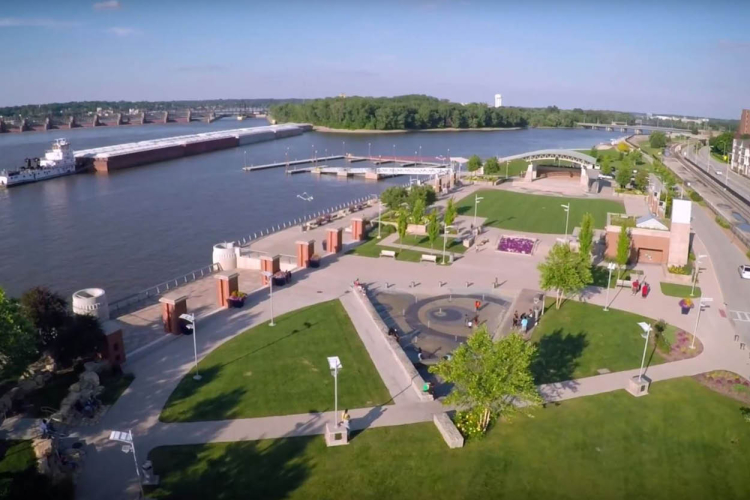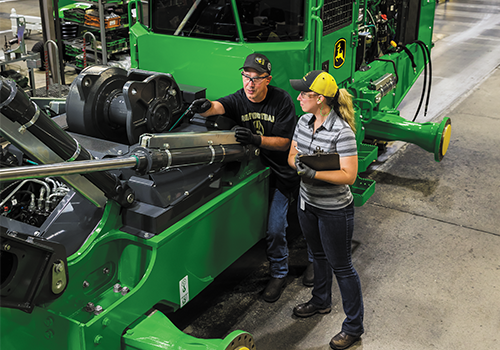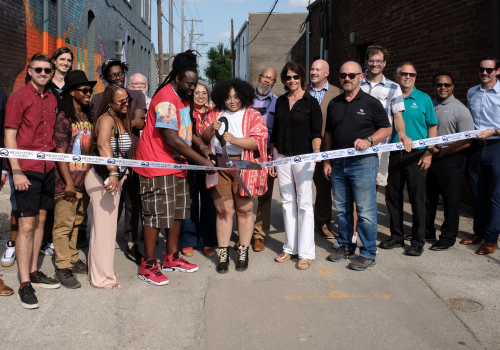New regional funding mechanism could bring big, bold ideas to life in Quad Cities

The Quad Cities has big ideas and ambitious goals, as outlined in the Q2030 Regional Action Plan. To implement these ideas designed to make the region a cooler, more creative, connected and prosperous region, additional funding is necessary.
In order to advance the Q2030 goals, the Quad Cities Chamber and community leaders are advocating for the creation of a bi-state regional funding mechanism – the Quad Cities Regional Metropolitan Authority – that allows for investment in quality of life and infrastructure initiatives on a regional basis.
“This is bigger than one city or one state," said Paul Rumler, Chamber President & CEO. "To achieve some of these transformational initiatives, we need a way that allows us to function as one cohesive region and mobilize our resources to turn those ideas into reality.”
HOW WE WIN
- Sets up a bi-state entity that allows us to manage and fund regional initiatives differently
- Creates a government authority that can work across state boundaries
- Establishes clear regional collaboration
- Helps achieve the goals outlined in Q2030
“We have gained great momentum with our Q2030 initiative to collectively begin to evolve and advance the region,” said Kent Pilcher, President of Estes Construction and Tri-Chair of the Q2030 Steering Committee. “This funding initiative is the type of tool that other communities, like Oklahoma City, Oklahoma, have used to accelerate the development and advancement of their region. This could be a key tool to significantly transform our communities.”
TWO-PHASE PLAN
1. Crafting and passing legislation in the States of Iowa and Illinois and U.S. Congress to create the funding mechanism – the Quad Cities Regional Metropolitan Authority
2. Setting up governance structure and soliciting input from the public on what should be invested in, created and/or built
"The enabling legislation is needed as a first step to permit a regional funding mechanism," said Mara Sovey Downing, Deere & Company's Vice President, Global Brand and Communications, and President, John Deere Foundation. "Quad Citizens then would have an opportunity to express their support for initiatives that could advance our region and make the area an even better place to live, work and raise a family."
Phase two would happen ONLY if phase one is successful.
PHASE 1: LEGISLATION
New legislation would create the Quad Cities Regional Metropolitan Authority through an interstate compact between Scott County, Iowa, and Rock Island County, Illinois. Legislation must be passed by the States of Iowa and Illinois, in addition to U.S. Congress.
The Authority could regionally collaborate in these focus areas:
- Riverfront development, including flood mitigation
- Regional planning and economic development
- Transportation and infrastructure, including but not limited to intermodal facilities, waste disposal systems, mass transit, bridges and river transit and ports
- Cultural and recreational amenities, including but not limited to parks, museums, trails, tourist and destination assets, zoos, centers for performing arts and botanical centers
- Education
- Natural resources
The legislation, when implemented, would create an eight-person board. The board members would be appointed by local elected officials with the advice and consent of their respective governing bodies. Board members would be term-limited to serving eight consecutive years and could be reappointed after a two-year break.
The board makeup, based on overall population and geographic representation, would be:
- City of Davenport - 2 members
- City of Bettendorf - 1 member
- Scott County - 1 member who cannot reside in either Davenport or Bettendorf
- City of East Moline - 1 member
- City of Moline - 1 member
- City of Rock Island - 1 member
- Rock Island County - 1 member who cannot reside in East Moline, Moline or Rock Island
The Authority would have the ability to collect funds from multiple sources, including philanthropic entities; private businesses; local, state and federal governments; and local taxes by referendum.
A COLLECTIVE EFFORT
The Quad Cities Regional Metropolitan Authority is the Chamber's top legislative priority. While advocacy efforts for the legislation have been led by the Chamber, phase one of the plan has received initial endorsements from other regional organizations, including Deere & Company, Quad Cities Community Foundation, Q2030 and Visit Quad Cities, among others.
“A plan of this magnitude requires the collaboration of many to ensure its success,” Rumler said. “Thank you to our many community partners who already have stepped forward in support. Being able to dream the big dreams for our region is made a lot easier with a mechanism in place to help make them happen.”
Download the document below to see the full two-phase plan for the Quad Cities Regional Metropolitan Authority.




